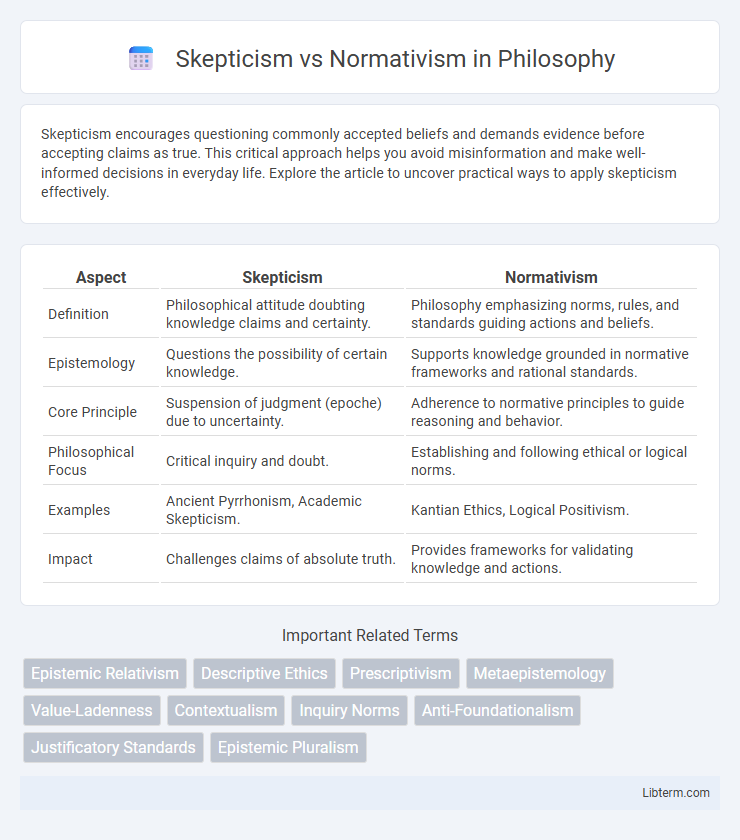Skepticism encourages questioning commonly accepted beliefs and demands evidence before accepting claims as true. This critical approach helps you avoid misinformation and make well-informed decisions in everyday life. Explore the article to uncover practical ways to apply skepticism effectively.
Table of Comparison
| Aspect | Skepticism | Normativism |
|---|---|---|
| Definition | Philosophical attitude doubting knowledge claims and certainty. | Philosophy emphasizing norms, rules, and standards guiding actions and beliefs. |
| Epistemology | Questions the possibility of certain knowledge. | Supports knowledge grounded in normative frameworks and rational standards. |
| Core Principle | Suspension of judgment (epoche) due to uncertainty. | Adherence to normative principles to guide reasoning and behavior. |
| Philosophical Focus | Critical inquiry and doubt. | Establishing and following ethical or logical norms. |
| Examples | Ancient Pyrrhonism, Academic Skepticism. | Kantian Ethics, Logical Positivism. |
| Impact | Challenges claims of absolute truth. | Provides frameworks for validating knowledge and actions. |
Defining Skepticism and Normativism
Skepticism challenges the existence of objective knowledge or justified beliefs, emphasizing doubt and questioning certainty in epistemology. Normativism asserts that epistemic concepts like justification and knowledge are governed by normative standards that guide rational belief formation and cognitive evaluation. These contrasting views shape debates on the nature of knowledge, with skepticism highlighting epistemic limitations and normativism emphasizing prescriptive criteria for belief assessment.
Philosophical Roots of Skepticism
Skepticism's philosophical roots trace back to ancient Greek thinkers like Pyrrho and Sextus Empiricus, who challenged the possibility of certain knowledge and advocated for suspension of judgment. This tradition emphasizes doubt and critical inquiry as methods to question the foundations of knowledge and belief systems, contrasting sharply with Normativism's focus on prescribing standards or norms for rationality and reasoning. Classical skepticism influenced modern epistemology by foregrounding the limits of human cognition and the importance of evidence-based inquiry.
Historical Origins of Normativism
Normativism originated in the late 19th and early 20th centuries as a response to skepticism, emphasizing the role of norms and values in shaping knowledge and reality. Rooted in German philosophical traditions, thinkers like Wilhelm Wundt and later Tadeusz Kotarbinski developed normativism to argue that human cognition and social behavior are governed by prescriptive rules rather than merely descriptive facts. This historical foundation positioned normativism as a critical framework challenging pure skepticism by affirming the normative structures underlying empirical inquiry and practical reasoning.
Core Differences Between Skepticism and Normativism
Skepticism challenges the certainty and reliability of knowledge claims, emphasizing doubt and questioning the existence of objective truths. Normativism asserts the existence of normative standards or principles that guide reasoning, behavior, and knowledge validation. The core difference lies in skepticism's rejection of absolute norms, whereas normativism upholds specific normative criteria to evaluate and justify beliefs.
Epistemological Implications
Skepticism challenges the possibility of attaining certain knowledge by questioning the reliability of sensory experience and justification processes, thus emphasizing epistemic humility and ongoing inquiry. Normativism, in contrast, asserts that epistemic norms regulate belief formation and justification, aiming for rational standards to guide knowledge acquisition and evaluation. The epistemological implications highlight a tension between accepting inherent uncertainty and seeking structured criteria for justified belief and knowledge claims.
Ethical Considerations in Both Views
Skepticism in ethics challenges the existence of objective moral truths, emphasizing the uncertainty and variability of moral judgments across cultures and individuals. Normativism asserts fixed ethical standards derived from rational principles or societal norms, advocating for consistent moral guidelines to govern behavior. Ethical considerations in skepticism involve questioning moral absolutes and promoting tolerance, while normativism prioritizes accountability and coherence in moral decision-making.
Skepticism and Normativism in Contemporary Philosophy
Skepticism in contemporary philosophy emphasizes doubt about the possibility of certain knowledge, challenging traditional epistemological claims by questioning the reliability of perception and reasoning. Normativism, by contrast, asserts that concepts and knowledge are inherently linked to normative rules and standards that guide belief and justification. Current debates explore how skepticism exposes limits in knowledge while normativism seeks to ground epistemic practices in evaluative norms.
Criticisms and Counterarguments
Skepticism faces criticism for fostering doubt that can paralyze decision-making and hinder practical action, as it challenges the possibility of certain knowledge and objective norms. Normativism counters by emphasizing the role of established rules and standards to guide rational behavior, arguing that skepticism overlooks the necessity of normative frameworks in social and ethical contexts. Critics of normativism argue it may impose rigid structures that ignore contextual nuances, prompting normativists to defend flexibility within norms to accommodate varied circumstances.
Real-World Applications and Influences
Skepticism in real-world applications often drives critical inquiry and scientific skepticism, encouraging rigorous evidence evaluation in fields like medicine and law. Normativism influences legal systems and ethical frameworks by establishing prescriptive rules that guide behavior and decision-making in governance and social institutions. Both perspectives shape policies and practices, with skepticism promoting questioning established norms and normativism reinforcing structured societal standards.
Future Directions in the Debate
Future directions in the Skepticism vs Normativism debate emphasize integrating empirical findings from cognitive science to inform normative theories of reasoning. Researchers are exploring how descriptive models of human thought processes challenge or support traditional normative standards. Advancements in interdisciplinary methodologies promise to refine our understanding of rationality and its normative implications.
Skepticism Infographic

 libterm.com
libterm.com